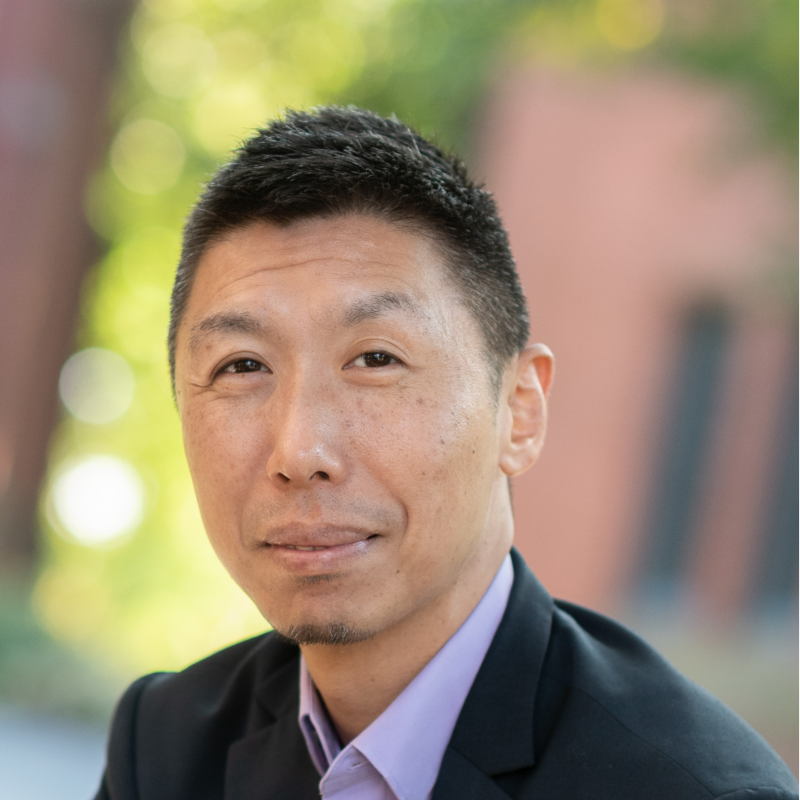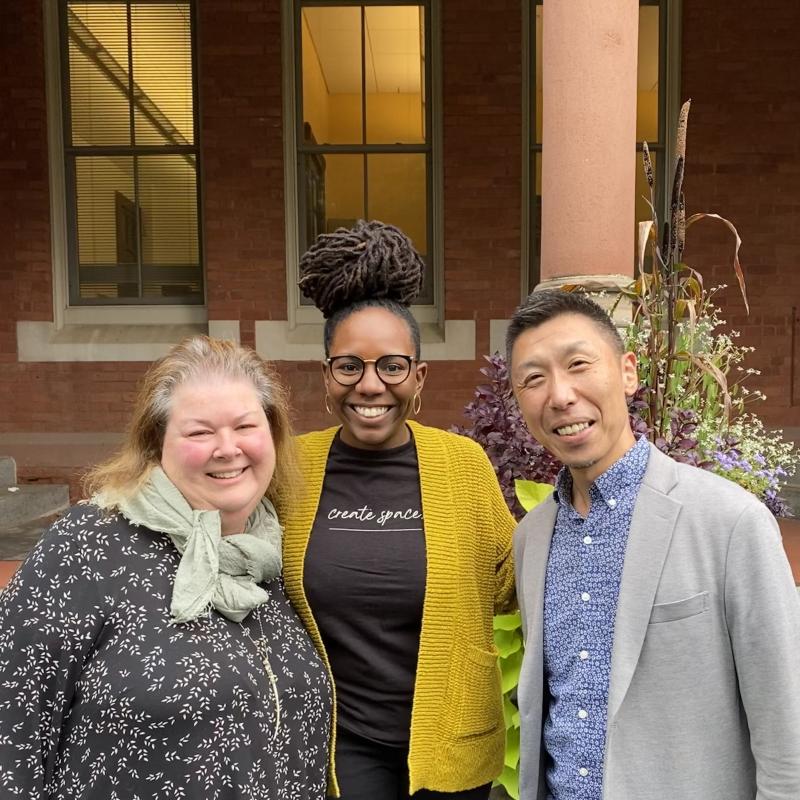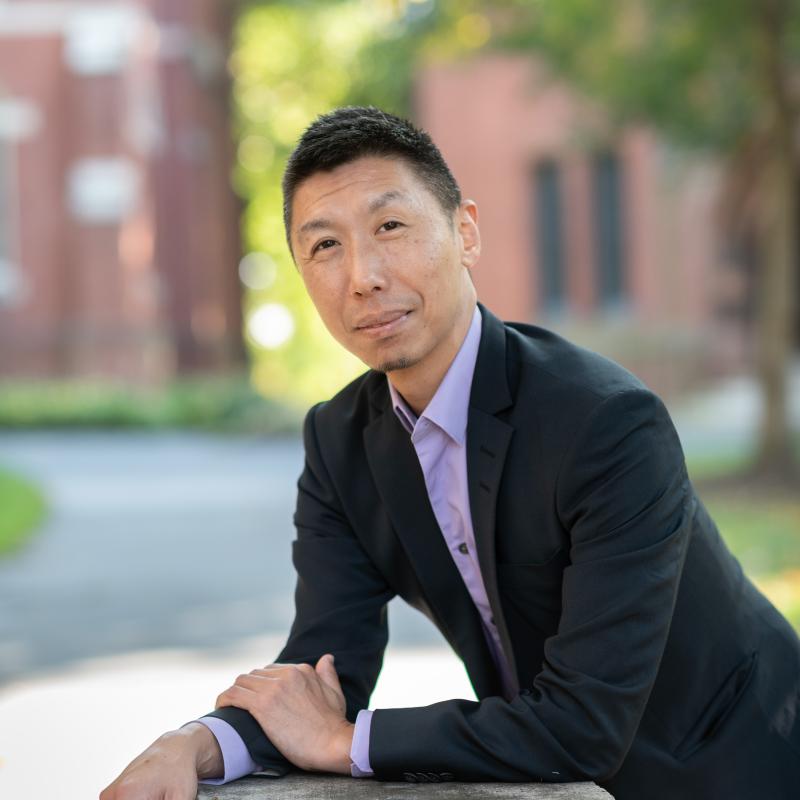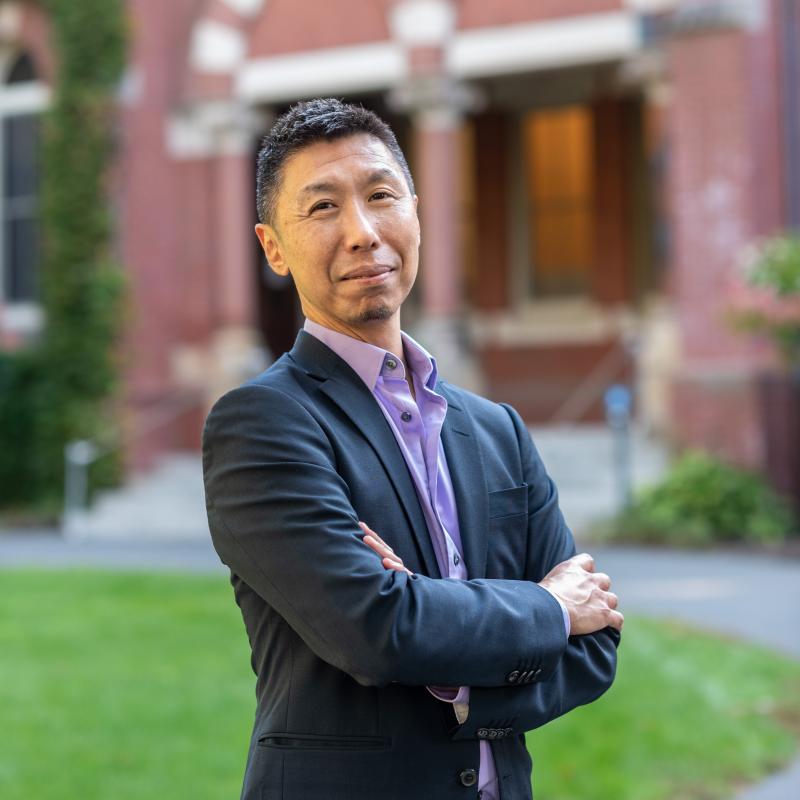Kenta Asakura, M.S.W. '04, Ph.D., LICSW
Office: Lilly Hall
Email: kasakura@smith.edu
Pronouns: he/him
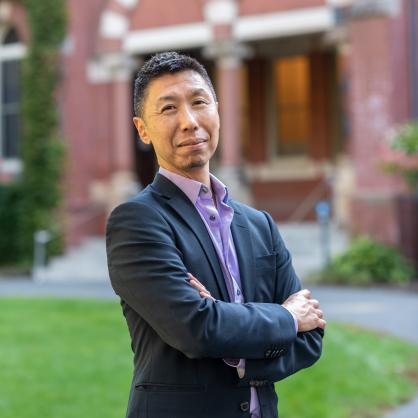
B.A., Southern Methodist University
M.S.W., Smith College School for Social Work
Postgraduate Certificate, Seattle Psychoanalytic Society & Institute
Ph.D., University of Toronto Factor-Inwentash Faculty of Social Work
Kenta Asakura’s scholarly work is informed by nearly two decades of clinical practice across three jurisdictions (New York, Washington, Ontario), where he worked mostly with queer and trans* communities, youth and families in care and racialized immigrants and refugees. He is committed to translating his research into pragmatic knowledge that can help prepare students and clinicians for competent practice with marginalized communities. Using qualitative, quantitative and theoretical methodologies, Asakura seeks to re-shape the definition of clinical social work as a highly skilled professional practice negotiated within complex intrapsychic, relational, social, historical and structural contexts. As a practitioner-researcher, Asakura maintains psychotherapy practice as a licensed independent clinical social worker in the states of Massachusetts, Washington, and Texas.
Seeking to advance the practice and teaching of clinical social work with marginalized communities, Asakura leads a program of simulation-based research. Using simulation (e.g., working with professional actors trained to portray realistic and complex client scenarios) as a research method, Asakura studies clinical social work competencies, particularly the application of theory, values and ethics, as well as the clinician’s cognitive and affective processes. Asakura is currently leading and working with a research team on a study titled “Bridging Critical Social Work Education and Clinical Practice: A Design-Based Research Study Using Simulated Practice” (2021–2026). Funded by Social Sciences and Humanities Research Council of Canada (SSHRC), this study seeks to develop an empirical model of clinical practice grounded in the theoretical principles of racial and social justice that will have utility and applicability to support clients from marginalized communities. Asakura is also working on a book project titled Becoming a Critical Clinical Social Worker: Therapeutic Principles, Processes, and Skills (under contract with Sage Publications).
A three-time teaching award recipient, Asakura has expertise in simulation-based teaching and learning. Using simulated clients (e.g., trained actors) in teaching clinical practice and assessing student competencies, this experiential pedagogy is designed to supplement practicum learning. Asakura has conducted numerous research studies, published and presented papers widely on various forms of simulation-based education (e.g., the use of live actors, virtual simulation platforms). As an educator and a researcher of this pedagogy, Asakura consults for colleagues and other schools of social work on implementing the use of simulation.
Since 2022, Asakura has served as the editor-in-chief of the Studies in Clinical Social Work: Transforming Practice, Education and Research, one of the oldest peer-reviewed journals in social work, formerly known as Smith College Studies in Social Work. Asakura also currently serves (2024–2027) as the director of the Clinical Research Institute (CRI), SSW’s internal research hub to support faculty and student research and mentorship.
Prior to joining Smith SSW in 2022 as an associate professor with tenure, Asakura spent seven years at Carleton University School of Social Work (Ottawa, Canada), where he was a tenured professor and the founding director of SIM Social Work Research Lab. Funded by Canada Foundation for Innovation, this was the first social work research lab in North America designed for collecting and analyzing real-time, video-recorded data on social workers’ engagement with simulated clients to better understand clinical competencies.
During the 2021-2022 sabbatical year, Asakura traveled to his home country Japan, where he served as a visiting professor of social work at Kwansei Gakuin University. Currently, Asakura also holds an appointment of honorary affiliate associate professor at the University of British Columbia School of Social Work in Vancouver, BC, as well as an adjunct research professor at Carleton University.
For a full list, see Professor Asakura’s ResearchGate page
Sewell, K. M., Janse van Rensburg, M., Peddle, M., Alschech, J., & Asakura, K. (2024). Supervision and wellness: A survey of human service practitioners. Human Service Organizations: Management, Leadership & Governance, 1–18. https://doi.org/10.1080/23303131.2024.2434527
Lanzieri, N., Dempsey, A. C., Malhotra, J., & Asakura, K. (2024). Preparing students for ADEI praxis: A case study of a practicum preparatory lab. Social Work Education: The International Journal, 1–14. https://doi.org/10.1080/02615479.2024.2431225
Tarshis, S., McQuaid, J., Diallo, M., Baird, S., & Asakura, K. (2024). Using simulation to train service providers in responding to intimate partner violence and trauma. Families in Society. https://doi.org/10.1177/10443894241246570
Asakura, K., Occhiuto, K., Tarshis, S., Gheorghe, R. M., & Todd, S. (2024). Guidelines for using simulations in qualitative research on social work practice competencies. Families in Society. https://doi.org/10.1177/10443894231210897: This manuscript was chosen as the journal’s 2024 Best Research Note award.
Gheorghe, R. M., Tarshis, S., & Asakura, K. (2023). Clinician perceptions of online therapy during the COVID-19 pandemic: A qualitative study. Families in Society. DOI:10.1177/10443894231193058
Lanzieri, N., McAlphin, E. C., & Asakura, K. (2023) A VR client simulation to prepare social work students for practicum: A feasibility study. Journal of Technology in Human Services. https://doi.org/10.1080/15228835.2023.2240382
Asakura, K., Gheorghe, R., Tarshis, S., & *Occhiuto, K. (2023). Translating critical social work into clinical practice: A pilot simulation-based study from Canada. Special Issue on Decolonizing Clinical Practice. Smith College Studies in Social Work. https://doi.org/10.1080/00377317.2023.2221353
Asakura, K. (2023). Editorial—Forging a new chapter: Message from the new Editor-in-Chief. Smith College Studies in Social Work, 93(1), 1-4. DOI: 10.1080/00377317.2023.2217738
Asakura, K. (2023). Towards a critical approach to simulation-based social work education: Guidelines for designing simulated client case scenarios. Journal of Social Work Education. https://doi.org/10.1080/10437797.2023.2203213
Asakura, K., Gheorghe, R., Rieger, D., Tarshis, S., Borgen, S., & D’Angiuli, A. (2022). Exploring shared trauma in the time of COVID: A simulation-based survey study of mental health clinicians. Clinical Social Work Journal. https://doi.org/10.1007/s10615-022-00860-0
Occhiuto, K., Sewell, K., & Asakura, K. (2022). Pivoting to online live-streamed simulations: Students’ experiences in clinical social work education. Journal of Social Work Education. https://doi.org/10.1080/10437797.2022.2089306
Asakura, K., Sewell, K., Rawlings, M., Bay, U., & Kourgiantakis, T. (2022). Marion Bogo, a visionary, innovator and leader: Ground-breaking work on simulation-based social work education. Journal of Social Work Education. https://doi.org/10.1080/10437797.2022.2069626
Asakura, K., Occhiuto, K., Tarshis, S., & Dubrowski (2021). Designing and conducting healthcare simulations: Contributions from social work. Cureus, doi: 10.7759/cureus.16193
Asakura, K. & Bogo, M. (2021). Editors, Special Issue on Advancing Clinical Social Work Education and Practice through Simulation, Clinical Social Work Journal, 49(2).
Asakura, K., & Bogo, M. (2021). The use of simulation in advancing clinical social work education and practice. Clinical Social Work Journal, 49(2), 111-116. https://doi.org/10.1007/s10615-021-00810-2
Todd, S., Occhiunto, K., Asakura, K., & Grassau, P. (2021). Navigating uncertainty in clinical social work practice: A simulation-based study. Clinical Social Work Journal, 49(2), 286-297, https://doi.org/10.1007/s10615-021-00800-4
Sewell, K., Kao, D., & Asakura, K. (2021). Clinical supervision in frontline health care: A survey of social workers in Ontario, Canada. Social Work in Health Care. DOI: 10.1080/00981389.2021.1880532
Asakura, K., Gheorghe, R., Borgen, S., Sewell, K., & MacDonald, H. (2020). Using simulation as an investigative methodology in researching competencies of clinical social work practice: A scoping review. Clinical Social Work Journal, 49(2), 231-243, https://doi.org/10.1007/s10615-020-00772-x
Asakura, K., Lee, B., Occhiunto, K. & Kourgiantakis, T. (2020). Observational learning in simulation-based social work education: Comparison of interviewers and observers. Social Work Education: The International Journal, https://doi.org/10.1080/02615479.2020.1831467
Asakura, K., Occhiuto, K., Todd, S., Leithead, C., & Clapperton, R. (2020). A call to action on Artificial Intelligence and social work education: Lessons learned from a simulation project using Natural Language Processing. Journal of Teaching in Social Work, 40(5), 501-518 https://doi.org/10.1080/08841233.2020.1813234
Kourgiantakis, T., Saunders, J., Sewell, K., Asakura, K. & Bogo, M. (2020). Students’ conceptualization of culture and diversity in social work practice: A simulation-based study. Journal of Ethnic and Cultural Diversity, https://doi.org/10.1080/15313204.2020.1839618
Asakura, K., Lundy, J., Black, D., & Tierney, C. (2019). Art as a transformative practice: A participatory action research project with trans* youth. Qualitative Social Work, 19(5/6), 1061-1077. https://doi.org/10.1177/1473325019881226
Asakura, K., Strumm, B., Todd, S., & Varghese, R. (2019). What does social justice look like when sitting with clients?: A qualitative study of teaching clinical social work practice from a social justice perspective. Journal of Social Work Education. 56(3), 442-455. https://doi.org/10.1080/10437797.2019.1656588
Todd, S., Asakura, K., Morris, B., Eagle, B., Park, G. (2019). Responding to student mental health concerns in social work education: Towards developing a heuristic blueprint. Social Work Education: The International Journal, 38(6), 779-796. https://doi.org/10.1080/02615479.2018.1563591
Tufford, L., Asakura, K., & Bogo, M. (2018). Students’ perceptions about simulation vs. role-plays in learning social work practice skills. Journal of Baccalaureate Social Work, 23(1), 249-267. https://doi.org/10.18084/1084-7219.23.1.249
Asakura, K., & Maurer, K. (2018). Attending to social justice in clinical social work: Supervision as a pedagogical space. Clinical Social Work Journal, 46(4), 289-297. doi.10.1007/s10615-018-0667-4
Asakura, K., Bogo, M., Good, B., & Power, R. (2018). Teaching Note— Social Work Serial: Using video-recorded simulated client sessions to teach social work practice. Journal of Social Work Education, 54(2), 397-404. doi: 10.1080/10437797.2017.1404525
Asakura, K., Todd, S., Eagle, B., & Morris, B. (2018). Strengthening the signature pedagogy of social work: Conceptualizing field coordination as a negotiated social work pedagogy. Journal of Teaching in Social Work, 38(2), 151-165. doi: 10.1080/08841233.2018.1436635.
Asakura, K. (2017). Paving pathways through the pain: A grounded theory of resilience among LGBTQ youth. Journal of Research on Adolescence, 27(3), 521-536.
Asakura, K. (2016). Extraordinary acts to “show up”: Conceptualizing resilience of LGBTQ youth. Youth & Society, 51(2), 268-285. 10.1177/0044118X16671430
Asakura, K. (2016). It takes a village: Applying a social ecological framework of resilience in working with LGBTQ youth. Families in Society, 97(1), 15-22.

